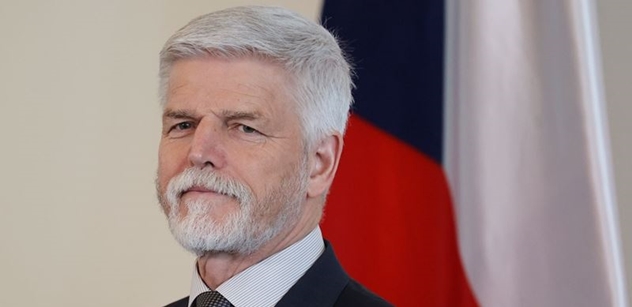10.10.2023 21:59 | monitoring
An out-of-court settlement with a family on good terms with Hitler seems sympathetic to President Peter Paul. This is against the suppression of property rights in the Czech Republic, Jana Popošíková discusses with lawyers the fact that such a meeting between the Head of State and the Prince of Liechtenstein can be explained in this way, in the program Abi Było Zasno. High treason.

Hans Stumpera
Description: President Peter Powell
“Can you imagine President Zeman meeting with Vladimir Putin after the Czech Republic’s assets were frozen at the United Nations and telling Prime Minister Fiala that the Czech Republic would co-administer it with Russia? Does it sound like science fiction? President Petr Pavel is doing something similar now, he’s meeting with the Prince of Liechtenstein. , discussed with him how to deal with assets confiscated from Liechtenstein after World War II by order of President Eduard Benes,” says Jana. Poposikova.
The reason is that the Liechtensteiners claimed German citizenship during World War II, which they currently deny. In 2020, the state of Liechtenstein appealed to the European Court of Human Rights, alleging illegal confiscation of their property since World War II.
President Peter Pavel intervened in the dispute between the Czech Republic and Liechtenstein, for example, the Letnice-Valdice area, which includes tens of thousands of hectares of fields and forests and several UNESCO monuments. Not for the first time, in September he personally met Prince Alois of Liechtenstein in New York and talked about an out-of-court settlement between the Czech Republic and Liechtenstein, which the Liechtensteiners want, continues the show’s host Abi. Philo Jasno.
“According to our information, the Liechtensteins fear that they will lose the court case in Strasbourg, which is why they tend to settle,” says Poposhikova.
In such a fundamental matter, it is not the President who acts on behalf of the Czech Republic, but the Czech Government and its representative before the European Court of Human Rights who represent the Czech Republic. He can act only within the limits set by the government, with the prior approval of the government or the justice minister, the assessee added, which applies to any settlement.
“Did you ever hear from the Fiel government or Justice Minister Blažek from the ODS that they wanted to reach an agreement with the Liechtensteins whose assets were confiscated according to the orders of President Benes? We didn’t. However, according to experts, the president, who had no say in the whole matter, had an out-of-court settlement with the Liechtenstein family, who were very good with Hitler. The solution seems very sympathetic,” notes Popozykova.
President Peter Pavel summarized the negotiations with the prince for Tennik as follows: “Liechtenstein is not asking for the return of the property, it is not asking for financial compensation. What they are interested in is the joint management of the property, in other words, the creation of some kind of fund or foundation between Liechtenstein and the Czech Republic, which is the maintenance of the property we are talking about. and will jointly take care of the activity. , especially the cultural monuments. If it is in this form, I think it will be a very solid solution, it does not require a court to do it.
According to his words, the President is looking forward to speaking with Prime Minister Fiala about the status of negotiations and where the obstacles lie. From what the prince had told him, he saw no controversy in this, since the property would still belong to the Czech government. According to him, the Liechtensteiners are not seeking transfer of ownership or any compensation but are only interested in administration.
Questionnaire
How do you remember Miloš Zeman over time?
Voted by: 21665 people
“However, President Peter Pavel went even further: last week he settled the dispute with Liechtenstein with the judge of the European Court of Human Rights, Katerina Shimikova. This is a court that has to rule on international disputes, and it is unacceptable,” says Poposikova.
He clearly adds a lawyer’s point of view. “According to the rules, Judge Katerina Simikova of the European Court of Human Rights should have categorically rejected the interview with President Petr Pavel and the possible agreement proposed by the Czech Republic with Liechtenstein. At the same time, she should have immediately informed the court administration about President Pavel’s attempt.
“However, Judge Shimakova found nothing wrong with the meeting with the President of the Czech Republic, who is lobbying for the interests of Liechtenstein, even though both countries are standing before the court, and he is also a judge. A very strange example of the ethics of a judge of the European Court of Human Rights, isn’t it?” Poposhikova pauses.
The news that President Peter Pavel settled the issue between the Czech Republic and Liechtenstein with a judge of the European Court of Human Rights and the Prince of Liechtenstein got some prominent lawyers off their chairs. According to one of them, the President is acting in violation of the Constitution. “The presented text of the media report, if true, raises legitimate concerns that the President of the Czech Republic, Peter Pavel, together with Prince Alois of Liechtenstein, is threatening the sovereignty of the Czech Republic. He is therefore acting in violation of the Constitution,” said Abiy Piło Zasnow’s lawyer.
He also explained that the establishment of joint management with another sovereign state over certain immovable properties on the territory of the Czech Republic owned by the state or private and public owners would clearly limit the property rights of these owners. In the case of any change of this property. However, above all, the Czech state cannot guarantee its sovereignty over the protection of this property. He would be bound by the status of another sovereign state and would have to respect it.
“Such an action by President Peter Pavel may qualify as high treason, as it is against the sovereignty of the Czech state,” the lawyer added. Prosecutors are also asking themselves whether Petr Pavel is a person who meets the criteria for the function of the President in the sense of national and international law.
Author: Natalya Prozowska
